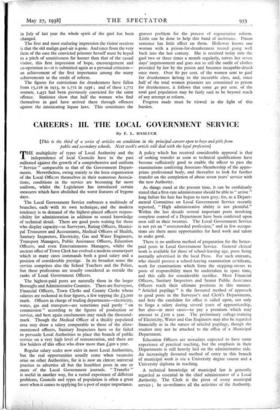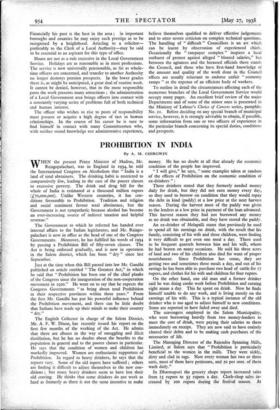CAREERS: III. THE LOCAL GOVERNMENT SERVICE
By E. L. HASLUCK [This is the third of a series of articles on conditions in the principal careers open to boys and girls from public and secondary schools. Next week's article will deal with the legal profession] THE multiplicity of types of Local Authority and the independence of local Councils have in the past militated against the growth of a comprehensive and uniform " Service " comparable to that of the Government Depart- ments. Nevertheless, owing mainly to the keen organisation of the Local Officm themselves in their numerous Associa- tions, conditions in the service are becoming far more uniform, whilst the Legislature has introduced certain measures which have- abolished the worst features of bygone days.
The Local Government Service embraces a multitude of branches, each with its own technique, and the modern tendency is to demand of the highest-placed officers respon- sibility for administration in addition to sound knowledge of technical detail. There are good posts waiting for those who display capacity—as Surveyors, Rating Officers, Munici- pal Treasurers and Accountants, Medical Officers of Health, Sanitary Inspectors, Electricity, Gas and Water Engineers, Transport Managers, Public Assistance Officers, Education Officers, and even Entertaimpents Managers, whilst the ancient office of Town Clerk has evolved a modem counterpart which in many cases commands both a good salary and a position of considerable prestige. In its broadest sense the service comprises also the School Teachers and the Police, but these professions are usually considered as outside the ranks of Local Government Officers.
The highest-paid posts are naturally those in the larger Boroughs and Administrative Counties. There are Surveyors, Financial Officers, Town Clerks and County Clerks whose salaries are reckoned in four figures, a few topping theL3,000 mark. Officers in charge of trading departments—electricity, water, gas and transport—are sometimes paid partly "on commission" according to the figures of production or service, and here again emoluments may reach the thousand- mark. Though the Medical Officer of a thickly populated area may draw a salary comparable to those of the afore- mentioned officers, Sanitary Inspectors have so far failed to persuade Local Authorities to place this branch of public service on a very high level of remuneration, and there are few holders of this office who draw more than L400 a year.
Regular salary scales now exist in most Local Authorities, but the real opportunities usually come when vacancies arise on other Authorities, for it is now an almost universal practice to advertise all but the humblest posts in .one or more of the Local Government journals. " Transfer " is useful in another way, for a varied 4xperiaxe of different problems, Councils and types of population is .often a great asset when it comes to applying for a post of major importance. A policy which has received considerable approval is that of seeking transfer as soon as technical qualifications have become sufficiently good to enable the officer to pass the examinations conferring Associate-Membership of the appro- priate professional body, and thereafter to look for further transfer on the completion of about seven years' service with the new Authority.
As things stand at the present time, it can be confidently stated that a first-rate administrator should be able to" arrive" long before his hair has begun to turn grey, for, as a Depart- mental Committee on Local Government Service recently reported, "High administrative ability is not plentiful." Within the last decade several important posts involving complete control of a Department have been conferred upon men still in their twenties. The Local Government Service is not yet an "overcrowded profession," and in few occupa- tions are there more opportunities for hard work and talent to make good.
There is no uniform method of preparation for the better- paid posts in Local Government Service. General clerical work is available for those of school-leaving age, posts being normally advertised in the local Press. For such entrants, who should possess a school-leaving examination certificate, work for examinations which form the stepping-stones to posts of responsibility must be undertaken in spare time, and this calls for considerable sacrifice. Most Financial Officers, Sanitary Inspectors and Senior Public Assistance Officers reach their ultimate positions in this manner. "Articled pupilage" is the favoured method of approach to good posts in the Surveyor's and Clerk's Departments, and here the candidate for office is called upon, not only to forgo a salary during several years of apprenticeship, but also—in most cases—to pay a premium which may amount to km° a year. The preliminary college-training of Electricity, Water and Gas Engineers may also be regarded financially as in the nature of articled pupilage, though the student may not be attached to the office of a Municipal Department.
Education Officers are nowadays expected to have some experience of practical teaching, but the emphasis in their Departments is still heavily laid on the administrative side. An increasingly favoured method of entry to this branch of municipal work is via a University degree course and a University diploma in teaching.
A technical knowledge of municipal law is generally regarded as essential in the chief administrator of a Local Authority. The Clerk is the pivot of every municipal service ; he co-ordinates all the activities of the Authority. Financially his post is the best in the area ; in important boroughs and counties he may enjoy such prestige as to be recognised by a knighthood. Articling to a solicitor— preferably to the Clerk of a Local Authority—may be said to be essential to an aspirant for this type of office.
Hours are not as a rule excessive in the Local Government Service. Holidays are as reasonable as in most professions. The service is now universally pensionable, as far as whole- time officers are concerned, and transfer to another Authority no longer destroys pension prospects. In the lower grades there is, as might be anticipated, a great deal of routine work. It cannot be denied, however, that in the more responsible posts the work presents many attractions ; the administration of a Local Government area brings officers into contact with a constantly varying series of problems full of both technical and human interest.
The officer who wishes to rise to posts of responsibility must possess or acquire a high degree of tact in human relationships. In the course of his career he is sure to find himself in contact with many Committeemen who, with neither sound knowledge nor administrative experience, believe themselves qualified to deliver effective judgements and to utter severe criticism on complex technical questions. The handling of " difficult " Councillors is an art which can be learnt by observation of experienced chiefs. Occasionally the " ratepayer complex" inspires a local outburst of protest against alleged " bloated salaries," but between the agitators and the harassed officials there stands the Council, and those who have first-hand knowledge of the amount and quality of the work done in the Council offices are usually reluctant to endorse unfair "economy ramps " at the expense of an efficient body of workers.
To outline in detail the circumstances affecting each of the numerous branches of the Local Government Service would occupy many pages. An excellent brief review of the major Departments and of some of the minor ones is presented in the Ministry of Labour's Choice of Careers series, pamphlet No. 21. Before deciding on any special branch of municipal service, however, it is strongly advisable to obtain, if possible, some information from one or two officers of experience in the particular branch concerning its special duties, conditions and prospects.



















































 Previous page
Previous page